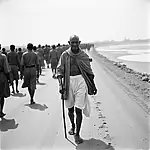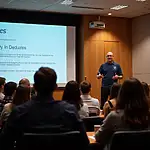The IELTS Speaking test often includes questions about personal experiences and lessons learned. One common topic that frequently appears is describing a valuable lesson you learned from someone. This question allows examiners to assess your ability to narrate a story, express emotions, and reflect on personal growth. Let’s explore how to effectively answer this question and maximize your score.
Part 1: Introduction and Interview
In Part 1, the examiner may ask general questions related to learning and personal development. Here are some possible questions:
- Do you enjoy learning new things?
- Who do you think are the best teachers in life?
- How do you prefer to learn – from books or people?
Let’s look at a sample answer for the third question:
Examiner: How do you prefer to learn – from books or people?
Candidate (Band 7-8 response): Well, I’d say I prefer a combination of both. Books are great for gaining in-depth knowledge on a subject, but learning from people offers a more interactive and practical experience. When I learn from others, I can ask questions and get immediate feedback, which helps me grasp concepts more quickly. However, books allow me to learn at my own pace and revisit information whenever I need to. So, I think both methods complement each other nicely in the learning process.
 Valuable lesson learned from someone: Books vs People
Valuable lesson learned from someone: Books vs People
Part 2: Long Turn
Here’s a sample cue card for this topic:
Describe a valuable lesson you learned from someone.
You should say:
- Who this person was
- What the lesson was
- How you learned it
- And explain why this lesson was valuable to youSample answer (Band 6-7):
I’d like to talk about a valuable lesson I learned from my high school math teacher, Mr. Johnson. The lesson he taught me was about the importance of perseverance and not giving up when faced with challenges.
I was never very good at math, and I often struggled with complex problems. One day, after failing a difficult test, I felt discouraged and told Mr. Johnson that maybe math just wasn’t for me. Instead of agreeing, he sat down with me and showed me how to break down the problems into smaller, more manageable steps.
He taught me that success often comes from persistence and taking things one step at a time. He encouraged me to keep practicing and not be afraid of making mistakes, as they were part of the learning process.
This lesson was incredibly valuable to me because it changed my entire approach to learning. I realized that with enough effort and the right mindset, I could overcome any obstacle. This newfound confidence helped me not only improve my math skills but also tackle other challenges in my life with a more positive attitude.
Mr. Johnson’s lesson taught me that our abilities are not fixed, and with hard work and determination, we can achieve things we once thought were impossible. This has been a guiding principle in my life ever since, and I’m grateful for the impact it has had on my personal and academic growth.
Sample answer (Band 8-9):
I’d like to share a profound lesson I learned from my grandfather, a man of remarkable wisdom and experience. The lesson he imparted was about the intrinsic value of integrity and how it shapes one’s character and life trajectory.
My grandfather was a respected community leader, known for his unwavering honesty and ethical stance. I vividly recall an incident when I was about 15 years old. I had been tempted to cheat on a school assignment due to time constraints and fear of failure. Sensing my inner turmoil, my grandfather sat me down for a heart-to-heart conversation.
He shared anecdotes from his own life, illustrating how maintaining integrity, even in the face of adversity or temptation, had earned him respect and opened doors that would have otherwise remained closed. He emphasized that integrity wasn’t just about being honest with others, but also about being true to oneself.
The way he conveyed this lesson was particularly impactful. Instead of lecturing, he encouraged me to reflect on the long-term consequences of my choices. He posed thought-provoking questions that led me to realize the ripple effects of our actions on our self-esteem, relationships, and future opportunities.
This lesson has been invaluable throughout my life. It has guided my decision-making in both personal and professional spheres, often serving as a moral compass in challenging situations. It has taught me that true success is not just about achieving goals, but about maintaining one’s principles along the journey.
Moreover, this lesson has fostered resilience within me. Knowing that I’m acting with integrity gives me the strength to face difficulties head-on, without compromising my values. It has also enhanced my interpersonal relationships, as people tend to trust and respect those who consistently demonstrate integrity.
In essence, my grandfather’s lesson transcended mere advice; it was a foundational principle that has significantly shaped my character and life philosophy. It continues to influence my choices and actions, serving as a testament to the enduring impact of wisdom passed down through generations.
 Grandfather teaching a valuable lesson about integrity
Grandfather teaching a valuable lesson about integrity
Follow-up questions:
- How has this lesson influenced your life since then?
- Do you think it’s easier to learn lessons from family members or from others?
- What are some other important life lessons you think everyone should learn?
Sample answers (Band 8-9):
-
This lesson has had a profound and lasting impact on my life. It has become a guiding principle in both my personal and professional endeavors. In my career, I’ve found that maintaining integrity has earned me the trust and respect of my colleagues and superiors, which has led to numerous opportunities for advancement. On a personal level, it has strengthened my relationships as friends and family know they can rely on my honesty and ethical behavior. Moreover, it has given me a sense of inner peace and self-respect, knowing that I’m living in alignment with my values, even when faced with difficult decisions.
-
I believe there are unique advantages to learning from both family members and others. Family members often have a deep understanding of our personality and background, which allows them to tailor their lessons to our specific needs and circumstances. There’s also a level of trust and emotional connection that can make their lessons more impactful. However, learning from others outside our family can provide fresh perspectives and diverse experiences that we might not encounter within our immediate circle. These external influences can challenge our preconceptions and broaden our worldview. Ultimately, I think a balance of both is ideal for comprehensive personal growth.
-
There are several crucial life lessons that I believe everyone should learn. Firstly, the importance of empathy and kindness – understanding and considering others’ perspectives can greatly enhance our relationships and social interactions. Secondly, the value of continuous learning and adaptability in our rapidly changing world. Thirdly, the significance of financial literacy and responsible money management for long-term stability and freedom. Lastly, the importance of self-care and maintaining a healthy work-life balance to prevent burnout and ensure overall well-being. These lessons, combined with integrity, form a solid foundation for a fulfilling and successful life.
Part 3: Two-way Discussion
In Part 3, the examiner will ask more abstract questions related to the topic. Here are some possible questions and sample answers:
Examiner: Do you think people learn more from their mistakes or their successes?
Candidate (Band 7-8 response): I believe people tend to learn more from their mistakes than their successes. When we succeed, we often take it for granted and may not analyze the factors that led to that success. However, when we make mistakes, it forces us to reflect on our actions and identify areas for improvement. Mistakes can be powerful teachers because they highlight our weaknesses and provide clear opportunities for growth. That being said, it’s important to learn from both successes and failures to get a well-rounded understanding of our capabilities and areas for development.
Examiner: How has technology changed the way people learn valuable lessons?
Candidate (Band 8-9 response): Technology has revolutionized the learning process in numerous ways. Firstly, it has democratized access to information, allowing people to learn valuable lessons from experts and thought leaders across the globe through online courses, webinars, and educational videos. This has broken down geographical and socioeconomic barriers to education.
Secondly, technology has made learning more interactive and engaging. Through simulations, virtual reality, and gamification, complex concepts can be presented in ways that are both educational and entertaining, enhancing retention and understanding.
Moreover, social media and online forums have created platforms for shared experiences and collective learning. People can now learn from others’ mistakes and successes on a global scale, gaining insights that were previously inaccessible.
However, it’s worth noting that this abundance of information also requires increased critical thinking skills. Not all online content is reliable, so learners must develop the ability to discern credible sources and validate information.
Lastly, technology has enabled more personalized learning experiences. Adaptive learning systems can tailor content to individual needs and learning styles, making the process of acquiring valuable lessons more efficient and effective.
In essence, while technology hasn’t changed the fundamental importance of learning life lessons, it has significantly expanded the scope, accessibility, and methods through which these lessons can be acquired and shared.
Key Vocabulary and Phrases for High Scores
To achieve a high score in IELTS Speaking, use a variety of advanced vocabulary and idiomatic expressions. Here are some relevant to this topic:
-
Profound impact /prəˈfaʊnd ɪmˈpækt/ (phrase): A deep or significant effect
Example: The lesson had a profound impact on my personal development. -
Paradigm shift /ˈpærəˌdaɪm ʃɪft/ (noun): A fundamental change in approach or underlying assumptions
Example: Learning this lesson caused a paradigm shift in my thinking about success. -
Introspection /ˌɪntrəˈspekʃən/ (noun): The examination of one’s own mental and emotional processes
Example: The experience led me to deep introspection about my values and goals. -
Resilience /rɪˈzɪliəns/ (noun): The capacity to recover quickly from difficulties
Example: The lesson taught me the importance of resilience in facing life’s challenges. -
Epiphany /ɪˈpɪfəni/ (noun): A moment of sudden and great revelation or realization
Example: It was an epiphany when I finally understood the true meaning of my grandfather’s advice. -
To internalize /ɪnˈtɜːrnəlaɪz/ (verb): To make a belief or value part of one’s nature by learning or unconscious assimilation
Example: Over time, I internalized the principles my mentor had taught me.
Remember to use these words and phrases naturally and in the appropriate context to demonstrate your language proficiency.
Examiner’s Advice
To excel in the IELTS Speaking test, particularly when describing a valuable lesson learned:
-
Practice storytelling: Develop your ability to narrate experiences coherently and engagingly.
-
Reflect on personal experiences: Prepare authentic stories that demonstrate self-awareness and personal growth.
-
Use a variety of tenses: Incorporate past, present, and future tenses to add depth to your narrative.
-
Employ descriptive language: Use vivid adjectives and adverbs to make your story more compelling.
-
Show, don’t just tell: Instead of simply stating emotions, describe how you felt through your actions and reactions.
-
Practice linking words and phrases: Use connectors to ensure smooth transitions between ideas.
-
Develop your answers: Aim to speak for 2-3 minutes in Part 2, providing detailed responses with examples.
-
Stay on topic: Ensure all parts of your answer relate to the main question and cue card points.
By following these tips and incorporating advanced vocabulary, you’ll be well-prepared to discuss valuable lessons learned and achieve a high score in your IELTS Speaking test.
describe a childhood game that you still remember
Remember, the key to success in IELTS Speaking is not just about memorizing answers, but about developing the ability to communicate effectively and spontaneously on a wide range of topics. Regular practice and exposure to English in various contexts will help you build the confidence and skills needed to excel in the test and in real-life communication situations.


